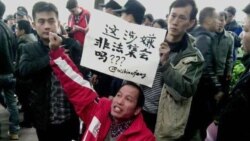The United States is concerned about increasing restrictions on free expression in China.
In its most recent human rights report on China, the State Department noted that “Efforts to silence and intimidate political activists and public interest lawyers continued to increase.” In addition, the report said, “The CCP [Communist Party of China] continued to increase efforts to monitor Internet use, control content, restrict information, block access to foreign and domestic Web sites, encourage self-censorship, and punish those who ran afoul of political sensitivities.” The State Department also reported that “Individuals who expressed views critical of the government or the CCP…risked punishments ranging from disciplinary action in the workplace to police interrogation and detention.”
Now the plight of foreign journalists in China is raising concern. Foreign journalists face restrictions from the government that impede their ability to do their jobs. There have been extended delays in processing journalist visas and restrictions on access to so-called “sensitive locations,” blocked websites and reports of cyber hacking of media organizations. A seasoned American journalist who had previously reported for a Hong Kong newspaper was recently denied a visa by the government. More than a dozen foreign journalists currently working in China could be forced to leave at the end of December if their visas are not renewed.
The United States believes that Chinese and foreign journalists and academics should be allowed to operate freely in China. Obstructing the free flow of information undermines the kind of open environment for free debate and discussion that supports innovation and dynamism.
On his recent trip to Beijing, Vice President Joe Biden reportedly raised the issue with Chinese President Xi Jinping and other Chinese officials. In a speech to an American business group there, Mr. Biden noted that “Innovation thrives where people breathe freely, speak freely, are able to challenge orthodoxy, where newspapers can report the truth without fear of consequences.”
Vice President Biden said the United States and China have “some profound disagreement on some of those issues right now, in the treatment of U.S. journalists. But I believe,” he said, “China will be stronger and more stable and more innovative if it respects universal human rights.”
In its most recent human rights report on China, the State Department noted that “Efforts to silence and intimidate political activists and public interest lawyers continued to increase.” In addition, the report said, “The CCP [Communist Party of China] continued to increase efforts to monitor Internet use, control content, restrict information, block access to foreign and domestic Web sites, encourage self-censorship, and punish those who ran afoul of political sensitivities.” The State Department also reported that “Individuals who expressed views critical of the government or the CCP…risked punishments ranging from disciplinary action in the workplace to police interrogation and detention.”
Now the plight of foreign journalists in China is raising concern. Foreign journalists face restrictions from the government that impede their ability to do their jobs. There have been extended delays in processing journalist visas and restrictions on access to so-called “sensitive locations,” blocked websites and reports of cyber hacking of media organizations. A seasoned American journalist who had previously reported for a Hong Kong newspaper was recently denied a visa by the government. More than a dozen foreign journalists currently working in China could be forced to leave at the end of December if their visas are not renewed.
The United States believes that Chinese and foreign journalists and academics should be allowed to operate freely in China. Obstructing the free flow of information undermines the kind of open environment for free debate and discussion that supports innovation and dynamism.
On his recent trip to Beijing, Vice President Joe Biden reportedly raised the issue with Chinese President Xi Jinping and other Chinese officials. In a speech to an American business group there, Mr. Biden noted that “Innovation thrives where people breathe freely, speak freely, are able to challenge orthodoxy, where newspapers can report the truth without fear of consequences.”
Vice President Biden said the United States and China have “some profound disagreement on some of those issues right now, in the treatment of U.S. journalists. But I believe,” he said, “China will be stronger and more stable and more innovative if it respects universal human rights.”






